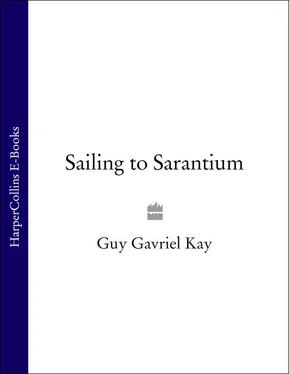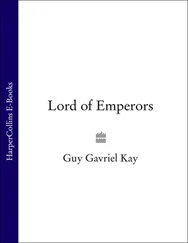Sailing to Sarantium
Book One of The Sarantine Mosaic
GUY GAVRIEL KAY

For my sons , Samuel Alexander and Matthew Tyler , with love, as I watch them
‘... fashion everything From nothing every day, and teach The morning stars to sing.’
. . . and we knew not whether we were in heaven or on earth. For on earth there is no such splendour or such beauty, and we were at a loss how to describe it. We know only that God dwells there among men, and their service is fairer than the ceremonies of other nations. For we cannot forget that beauty.
—Chronicle of the Journey of Vladimir, Grand Prince of Kiev, to Constantinople
Contents
Cover
Title Page Sailing to Sarantium Book One of The Sarantine Mosaic GUY GAVRIEL KAY
Epigraph . . . and we knew not whether we were in heaven or on earth. For on earth there is no such splendour or such beauty, and we were at a loss how to describe it. We know only that God dwells there among men, and their service is fairer than the ceremonies of other nations. For we cannot forget that beauty. —Chronicle of the Journey of Vladimir, Grand Prince of Kiev, to Constantinople
Prologue
Part One
Chapter I
Chapter II
Chapter III
Chapter IV
Chapter V
Part Two
Chapter VI
Chapter VII
Chapter VIII
Chapter IX
Chapter X
Acknowledgments
About the Author
Also by Guy Gavriel Kay
Copyright
About the Publisher
Prologue
Thunderstorms were common in Sarantium on midsummer nights, sufficiently so to make plausible the oft-repeated tale that the Emperor Apius passed to the god in the midst of a towering storm, with lightning flashing and rolls of thunder besieging the Holy City. Even Pertennius of Eubulus, writing only twenty years after, told the story this way, adding a statue of the Emperor toppling before the bronze gates to the Imperial Precinct and an oak tree split asunder just outside the landward walls. Writers of history often seek the dramatic over the truth. It is a failing of the profession.
In fact, on the night Apius breathed his last in the Porphyry Room of the Attenine Palace there was no rain in the City. An occasional flash of lightning had been seen and one or two growls of thunder heard earlier in the evening, well north of Sarantium, towards the grain-lands of Trakesia. Given the events that followed, that northern direction might have been seen as portent enough.
The Emperor had no living sons, and his three nephews had rather spectacularly failed a test of their worthiness less than a year before and had suffered appropriate consequences. There was, as a result, no Emperor Designate in Sarantium when Apius heard—or did not hear—as the last words of his long life, the inward voice of the god saying to him alone, ‘ Uncrown, the Lord of Emperors awaits you now. ’
The three men who entered the Porphyry Room in the still-cool hour before dawn were each acutely aware of a dangerously unstable situation. Gesius the eunuch, Chancellor of the Imperial Court, pressed his long, thin fingers together piously, and then knelt stiffly to kiss the dead Emperor’s bare feet. So, too, after him, did Adrastus, Master of Offices, who commanded the civil service and administration, and Valerius, Count of the Excubitors, the Imperial Guard.
‘The Senate must be summoned,’ murmured Gesius in his papery voice. ‘They will go into session immediately.’
‘Immediately,’ agreed Adrastus, fastidiously straightening the collar of his ankle-length tunic as he rose. ‘And the Patriarch must begin the Rites of Mourning.’
‘Order,’ said Valerius in soldier’s tones, ‘will be preserved in the City. I undertake as much.’
The other two looked at him. ‘Of course,’ said Adrastus, delicately. He smoothed his neat beard. Preserving order was the only reason Valerius had for being in the room just now, one of the first to learn the lamentable situation. His remarks were . . . a shade emphatic.
The army was primarily east and north at the time, a large element near Eubulus on the current Bassanid border, and another, mostly mercenaries, defending the open spaces of Trakesia from the barbarian incursions of the Karchites and the Vrachae, both of whom had been quiescent of late. The strategos of either military contingent could become a decisive factor—or an Emperor— if the Senate delayed.
The Senate was an ineffectual, dithering body of frightened men. It was likely to delay unless given extremely clear guidance. This, too, the three officials in the room with the dead man knew very well.
‘I shall,’ said Gesius casually, ‘make arrangements to have the noble families apprised. They will want to pay their respects.’
‘Naturally,’ said Adrastus. ‘Especially the Daleinoi. I understand Flavius Daleinus returned to the City only two days ago.’
The eunuch was too experienced a man to actually flush.
Valerius had already turned for the doorway. ‘Deal with the nobility as you see fit,’ he said over his shoulder. ‘But there are five hundred thousand people in the City who will fear the wrath of Holy Jad descending upon a leaderless Empire when they hear of this death. They are my concern. I will send word to the Urban Prefect to ready his own men. Be thankful there was no thunderstorm in the night.’
He left the room, hard-striding on the mosaic floors, burly-shouldered, still vigorous in his sixtieth year. The other two looked at each other. Adrastus broke the shared gaze, glancing away at the dead man in the magnificent bed, and at the jewelled bird on its silver bough beside that bed. Neither man spoke.
Outside the Attenine Palace, Valerius paused in the gardens of the Imperial Precinct only long enough to spit into the bushes and note that it was still some time before the sunrise invocation. The white moon was over the water. The dawn wind was west; he could hear the sea, smell salt on the breeze amid the scent of summer flowers and cedars.
He walked away from the water under the late stars, past a jumble of palaces and civil service buildings, three small chapels, the Imperial Silk Guild’s hall and workspaces, the playing fields, the goldsmiths’ workshops, and the absurdly ornate Baths of Marisian, towards the Excubitors’ barracks near the bronze gates that led out to the City.
Young Leontes was waiting outside. Valerius gave the man precise instructions, memorized carefully some time ago in preparation for this day.
His prefect withdrew into the barracks and Valerius heard, a moment later, the sounds of the Excubitors— his men for the last ten years—readying themselves. He drew a deep breath, aware that his heart was pounding, aware of how important it was to conceal any such intensities. He reminded himself to send a man running to inform Petrus, outside the Imperial Precinct, that Jad’s Holy Emperor Apius was dead, that the great game had begun. He offered silent thanks to the god that his own sister-son was a better man, by so very much, than Apius’s three nephews.
He saw Leontes and the Excubitors emerging from the barracks into the shadows of the pre-dawn hour. His features were impassive, a soldier’s.
It was to be a race day at the Hippodrome, and Astorgus of the Blues had won the last four races run at the previous meeting. Fotius the sandalmaker had wagered money he couldn’t afford to lose that the Blues’ principal chario -teer would win the first three races today, making a lucky seven in a row. Fotius had dreamt of the number twelve the night before, and three quadriga races meant Astorgus would drive twelve horses, and when the one and the two of twelve were added together . . . why, they made a three again! If he hadn’t seen a ghost on the roof of the colonnade across from his shop yesterday afternoon, Fotius would have felt entirely sure of his wager.
Читать дальше













